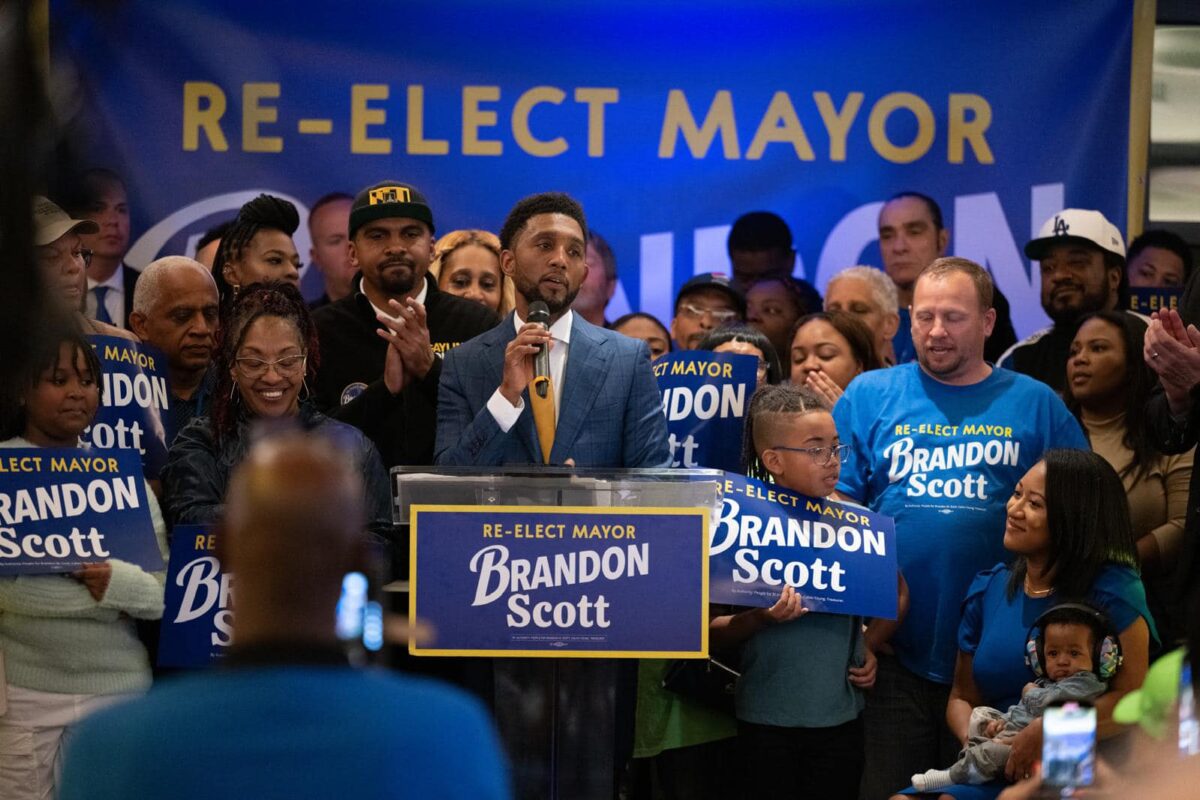
Incumbent Mayor Brandon Scott defeated Sheila Dixon, the former mayor who was forced to resign in scandal, in surprisingly convincing fashion Tuesday night in the city’s Democratic mayoral primary—all but ensuring a second term for the 40-year-old Scott.
Four years ago, Scott, then city council president, defeated Dixon by just two percentage points (29.6 percent to 27.5 percent) in a crowded race that took the better part of a week to tally amid COVID-19 mail-in balloting. This time, with 295 of 295 precincts reporting, Scott won with 51 percent of the vote versus 41.3 percent for Dixon.
A mid-April Baltimore Sun/Fox45/University of Baltimore poll had showed Scott ahead by just a three-point margin, and many political observers viewed the race as a toss-up. After leading the city through the COVID pandemic with generally high marks, Scott has similarly received praise for his response to the Francis Scott Key Bridge collapse—which may have given his campaign a boost.
More pertinent to his reelection bid, Baltimore witnessed a more than 20 percent drop in homicides last year under his tenure. The city is currently on track to make even more dramatic progress this year. How much credit for the ongoing decline goes to Scott’s innovative gun-violence reduction strategy may be difficult to parse—but it’s is clear Baltimore voters chose to stay the course rather than return to the past.
This was 70-year-old Dixon’s third campaign to take back the mayor’s office after she resigned in 2010 as part of a plea deal after being found guilty of embezzling gift cards intended for needy families. Dixon left her campaign party in Remington shortly before the Associated Press called the race for Scott, indicating that she would wait until the at least 13,000-plus mail-in ballots were counted before conceding.
“Tonight, you made it very clear that your democracy was not for sale,” Scott said at his Baltimore Peninsula election night party after the A.P. called the contest, a not-so-subtle reference to Dixon’s support from a super PAC funded in large measure by the conservative executive chairman of the Sinclair Broadcast Group, David Smith. “I am blessed to have another term to serve as your mayor.”
In the other major contested citywide race, District 1 Councilman Zeke Cohen, who ran what was widely considered the most vigorous and best-organized local primary campaign, ousted one-term incumbent City Council President Nick Mosby by 25 percentage points. Cohen received 49 percent of the vote, followed by former City Councilmember Shannon Sneed, who finished second with 26 percent of the vote. Mosby, who has been plagued by personal financial problems—his ex-wife’s recent mortgage fraud and perjury convictions—and election reporting issues, came in third with 24 percent.
Nick Mosby’s sound defeat, paired with former City State’s Attorney Marilyn Mosby’s failed reelection bid in 2022, mark a remarkable fall from grace for the one-time rising political power couple. Her sentencing in federal court is scheduled for May 23.
There were several other surprises in City Council races, but Prince George’s County Executive Angela Alsobrooks’ margin over Rep. David Trone in the hotly contested Democratic primary to replace outgoing U.S. Senator Ben Cardin was a particularly remarkable outcome.
Trone, the owner of Total Wine & More, spent more than $61 million in the hard-fought campaign, and polls indicated that he had a much closer race than Alsobrooks’ 60 percent to 35 percent margin of victory. She’ll face Larry Hogan, the former Republican governor, in what will be one of the most closely watched U.S. Senate races in the country—with majority control of the Senate possibly at stake.
“On November 5, 2024, we are going to defeat Larry Hogan, keep Maryland blue,” Alsobrooks posted on X after her victory, “and keep our Senate under Democratic control—spread the word.”
In terms of the City Council positions that are changing hands—or still up for grabs depending on mail-in and provisional votes that remain to be counted—Mark Parker, a pastor and longtime community activist won Cohen’s District 1 seat with 53.7 percent of the vote.
In District 8, Paris Gray, the community outreach coordinator for outgoing Councilman Kristerfer Burnett, was ahead by a slim margin, just 53 votes at press time, in his effort to succeed the incumbent
In District 12, Jermaine Jones, former president of the Metropolitan Baltimore Council of the AFL-CIO, appears to be on his way to upsetting incumbent Robert Stokes with a margin of 140 votes.
In District 11, incumbent Eric Costello finished primary night just 25 votes ahead of challenger Zac Blanchard, a Naval Academy grad, former U.S. Marine, and community association president.
Incumbents who won their City Council Democratic primary races are: John Bullock, District 9; Mark Conway, District 4; Ryan Dorsey, District 3; Antonio Glover, District 13; Danielle McCray, District 2; Sharon Green Middleton, District 6; Phylicia Porter, District 10; Odette Ramos, District 14; and Yitzy Schleifer, District 5.
